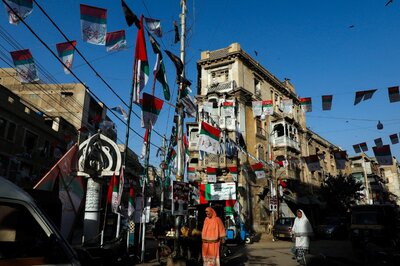
views
What is “Tabarruj?”
”Tabarruj” refers to the inappropriate display of a Muslim woman’s beauty. It is an Islamic concept that is used toward women when they purposely flaunt their physical beauty in a way deemed unlawful by Islamic standards. This often involves failing to observe hijab—modest clothing and lowered gaze. Some things considered to be “tabarruj” are: Wearing makeup Displaying jewelry Wearing perfume in public Failing to fully cover hair Donning rhinestones or diamonds Sporting high heels
Tabarruj is centered around modesty. Islamic teachings on modesty aim to shield women from objectification, harassment, and harm, while cultivating a sense of dignity and self-worth. In Islamic teachings, the concept of Tabarruj applies to both men and women. Men are equally obligated to lower their gaze and conduct themselves modestly. This mutual respect between the genders is essential for fostering a harmonious society. The way Tabarruj is interpreted and practiced can differ across cultures and communities, yet its fundamental principles of modesty and propriety endure.
Tabarruj and the Qur’an
Tabarruj is considered disobedience towards Allah. It is reported that Mu'awiyah gave a sermon in Syria and mentioned that the Prophet prohibited seven things, including Tabarruj. Abdullah bin Mas'oud reported that the Prophet "used to dislike ten kinds of behavior," including "Tabarruj by means of displaying beautification in an improper place." However, beautification for one's husband is not included in this prohibition.
It is said that Tabarruj is a sin. Umay'mah, the daughter of Ruqay'ah, is believed to have come to the Messenger of Allah to profess her belief in the message of Islam and to acknowledge him as the Messenger. In response, the Prophet said to her: “I give my acknowledgment that you must not set partners to worship besides Allah and that you don’t steal or commit fornication and adultery, that you don’t kill your child, that you don’t commit any falsehood before your hands and between your legs, that you don’t wail, and that you don’t make Tabarruj like that of Jaahiliyyah.”
It is believed that Tabarruj brings upon curses. According to The Messenger of Allah, “There shall be, in the latter part of my nation, women who are dressed but (in fact) naked, on their heads are humps like those of Bukht (one kind of camel), curse them for they are surely cursed.” Muslims interpret this as a message of a curse and the expulsion of the mercies of Allah.
Tabarruj and Hadith
Tabarruj is mentioned in a hadith narrated by Abu Udhaynah. Hadith refers to the oral traditions containing the reported words, actions, and approvals attributed to the Prophet Muhammad, which form an important part of Islamic scripture. Abu Udhaynah reported that The Messenger of Allah said: “The best of your women are loving, fertile, suitable, and comforting, if they fear Allah. The worst of your women unveil their beauty, take pride in their appearance, and they are hypocrites. None of them will enter Paradise except as rarely as you see a red-beaked crow.”
Tabarruj in Modern Culture
Tabarruj is often seen in memes. In Muslim cultures, the concept of Tabarruj has spread through the use of memes. These memes typically feature images of clothing deemed inappropriate by Islamic standards, overlaid with Quranic verses about Tabarruj. Some memes also include images of makeup, visually conveying that Tabarruj refers not just to revealing attire, but also to any form of beautification.
Some modern Muslim women find Tabarruj to be too strict. Many women have revealed on TikTok that they find it difficult to wear anything that isn’t considered “Tabarruj” and any feminine activities they partake in are automatically seen as sinful. While plenty of modern Muslim women have adopted the practice of wearing makeup and partaking in skincare, they often still keep Tabarruj in mind as a guide to not go too far.



















Comments
0 comment